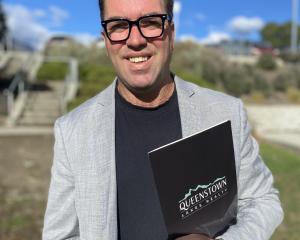
Queenstowners should be delighted a Scottish astronomer retired early from his professional life in Australia.
Since moving here in 2019, just before Covid, Professor Brian Boyle’s been active in educating people about our amazing dark skies.
Following a year’s work, he was thrilled when the Kawarau-Gibbston was awarded international dark sky park status.
And this month, in addition to his Gibbston observatory, he’s launching an astrophotography gallery, SkyBox, to promote astro-tourism.
This amiable 64-year-old says he decided to become an astronomer at only 7 when taken by his mum to see the 1968 science fiction film, 2001: A Space Odyssey.
"The last 20 minutes scared the bejesus out of me and it left me with this feeling of, ‘what is out there?’.
"And that inquiry into our ultimate origins in the universe never left me.
"My school insisted I put down medicine as my first choice for university, because nobody serious ever did astronomy,
"I was accepted and then ran away to join the astronomy circus."
Brian did an undergraduate degree in his home city, Edinburgh, then a PhD in Durham, England.
He then undertook a number of post-doctorate research fellowships before, still in his mid-30s, he was offered the directorship of the Australian Astronomical Observatory in 1996.
Based in Sydney till 2019, he assumed a number of leadership roles in astronomy and science-direction setting.
He was part of a team awarded the Nobel Prize in Physics for discovering the universe is accelerating, not decelerating, and pioneered the world’s largest radio telescope, in Western Australia.
Awarded a professor’s title for an adjunct role with the University of New South Wales, he adopted it when made a ‘professor emeritus’ as a going-away gift.
Brian says he could have "sat around in academic boards and committees and blown smoke up people’s arses for the rest of my life".
But he decided to challenge himself again and, not wanting to stay in Sydney — "I wasn’t that into beaches or surfing, I was much more into mountain climbing, biking" — moved here instead.
He initially settled in Speargrass Flat, building an observatory in his backyard.
In 2022, wanting to be under a dark sky, he moved to Gibbston, buying a house and 1.5-hectare vineyard from Hawkshead’s Denis Marshall which he’s named ‘Antimony’ (a semi-metallic chemical element).
"I now rent it back to Denis for the princely sum of a case a month."
Brian’s first local community involvement was with the Friends of Lake Hayes, analysing the amount of sediment and phosphorous flowing into the lake — "I’m still on the committee but not with the same level of intensity".
He also became chair of the Winterstellar Charitable Trust which promotes astronomy education in Otago/Southland, Maori culture and astrophotography through regular exhibitions.
Brian’s come to public attention through Matariki Day talks in Arrowtown and on Coronet Peak.
In the past eight years, he explains the average brightness of the night sky worldwide has doubled so we see 50% fewer stars.
Gibbston and Glenorchy, which has also attracted dark sky status, are "incredibly blessed", he explains, to be in only 0.1% of the world’s land area where you can see both the centre of the Milky Way galaxy and Aurora Australis regularly.
"I’d love to see the aurora forecast mentioned in the same breath as the weather forecast and snow forecast here."
After securing Gibbston’s dark sky park status last May, Brian was disturbed about Gibbston Valley Station’s (GVS) fast-track plans for a 900-unit subdivision potentially risking that status.
However, he says he’s advocating collaboration with GVS boss Greg Hunt, "and we’re talking about what lighting restrictions would have to be inplace".
Brian says he’s "come alive" living here.
"I came here principally for things like mountains and bike paths, and what did I find?
"I found great people, and that’s what’s kept me here."
He loves the chance to educate and inspire people about our dark skies.
"It is a passion project, a vanity project, call it what you like, but I’m having the time of my life."
He also has a home-brew set-up and has produced a beer from goldfields hops he found in Macetown.
"I play a guitar — I’ve suffered for my music, now it’s your turn."
And he adds "I’ve got a beautiful Brazilian partner whose EQ is even higher than my IQ".












